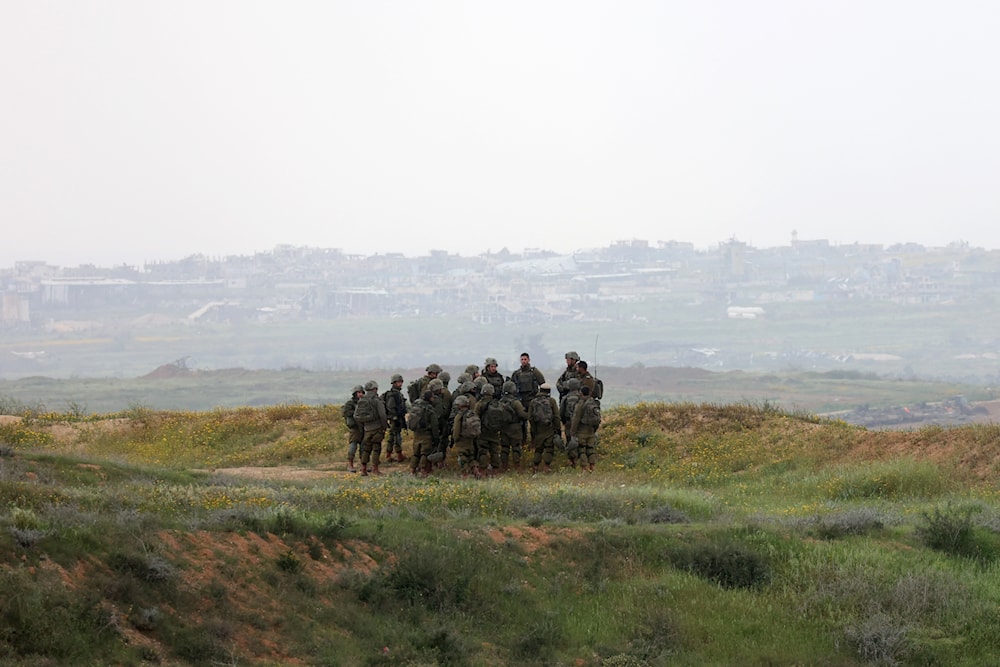Israeli military faces growing reservist fatigue amid renewed Gaza war
As "Israel's" war against Gaza resumes, concerns within the occupation entity grow over the strain on reservists, declining morale, and the contentious issue of ultra-Orthodox conscription.
-
 Israeli soldiers stand in a position along the northern Gaza Strip on March 20, 2025 (AFP)
Israeli soldiers stand in a position along the northern Gaza Strip on March 20, 2025 (AFP)
As "Israel" resumes its aggression against Gaza this week, thousands of reservists in the Israeli military, including some who have been in uniform for extended periods, now face the prospect of an imminent return to combat, the Financial Times reported on Thursday.
Israeli Prime Minister Benjamin Netanyahu and newly appointed military Chief of Staff Eyal Zamir have threatened that "Israel" may launch an intensified ground assault in Gaza if Hamas does not agree to release additional Israeli captives.
However, concerns are mounting over the Israeli military's capacity to sustain prolonged warfare. Historically, "Israel" has engaged in short, decisive wars—often lasting only days or weeks—to limit the strain on its reservists, who supplement the regular army, FT noted.
With no clear resolution in sight, both military analysts and reservists are warning of increasing attrition, as personal and professional lives remain indefinitely disrupted.
Discontent is also growing over Netanyahu’s government’s handling of the war, particularly its refusal to halt fighting despite domestic pressure for a negotiated deal to secure the release of remaining captives held by the Palestinian Resistance, the report added.
“For the first time [since the start of the war] there may be a chance some reservists won’t report for duty,” said Amos Harel, a defense analyst at Haaretz and an expert on civil-military relations.
“This could become a bigger problem if there’s no consensus behind the war.”
Since the war's onset, the Israeli military's figures indicate that over 800 soldiers have been killed and approximately 6,000 wounded. Some analysts argue the actual number is higher when factoring in mental health conditions such as post-traumatic stress disorder (PTSD).
Military officials stress that the military needs an additional 10,000 troops, particularly in armored and infantry brigades, to strengthen borders and maintain buffer zones indefinitely. However, expanding the Israeli military faces a major hurdle: the longstanding exemption of ultra-Orthodox (Haredi) Jewish men from military service.
The ultra-Orthodox community, comprising around 14% of the Israeli population, has been exempt from conscription since the occupation entity's founding—a policy that had already sparked opposition before the war. The Israeli Supreme Court has ruled this exemption unconstitutional, and the vast majority of Jewish Israelis support drafting Haredi men.
Despite this, Netanyahu—whose ruling coalition relies on ultra-Orthodox parties—has made it clear that his government does not intend to enforce conscription on the Haredi population. Official figures show that, out of more than 10,000 draft notices issued to ultra-Orthodox men in the past year, only a few hundred have enlisted.
Moreover, a poll conducted by the Reservists’ Wives Forum last November found that 80% of respondents reported a decline in motivation to serve, citing both personal difficulties and frustration over the lack of ultra-Orthodox conscription.
Several reservists interviewed by the Financial Times said that while outright resignation from their units remains rare, there is a growing tendency to miss training or operational call-ups for personal reasons.
One reserve officer stationed near the Gaza border for months noted that attendance rates in some reservist units have dropped to “less than half.” Harel, the defense analyst, corroborated this estimate, warning that broader debates over the war’s direction could further exacerbate discontent.
Yedioth Ahronoth: Decline in reservists' response rates due to fatigue
In a related context, the Israeli newspaper Yedioth Ahronoth reported a decline in the response rates of Israeli soldiers summoned for reserve service, attributing this to "fatigue and increasing burdens."
According to the newspaper, Israeli reserve officers, including battalion commanders, have warned of a continued drop in attendance rates for reserve service.
Earlier, the newspaper had reported on declining recruitment rates among Israeli reservists, amid the Haredi community’s continued avoidance of conscription and the resumption of war in the Gaza Strip.
Yedioth Ahronoth also noted that the Israeli military has been forced to take extraordinary measures, offering incentives to reserve fighters in an attempt to address the crisis. Under this arrangement, soldiers receive a full salary despite serving on a rotational schedule of one week in military service followed by a full week at home.
The newspaper explained that this approach places a significant economic burden on "Israel", as it costs "tens of millions of shekels every quarter." Additionally, it warned that such measures undermine the army’s value and erode soldiers’ motivation.
It further stated that the majority of Israeli military fighters are effectively becoming "employees", particularly among young soldiers—most of whom are between 22 and 23 years old—as well as those who have yet to secure stable employment and prefer reserve service due to its financial benefits and grants.
Read more: Hamas warns 'Israel' against escalation in Gaza amid ground invasion

 5 Min Read
5 Min Read








